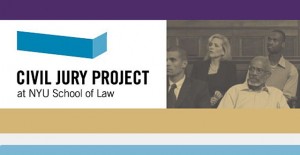Source of article DOAR Litigation Consulting.


Stephen Susman
In a series of articles on Law 360, Steve Susman, Richard Lorren Jolly and DOAR Jury Consultant Roy Futterman provide the Civil Jury Project’s proposed innovations for improved jury trials:
This is the fifth in a series of articles on the Civil Jury Project’s proposed innovations that can resuscitate the American jury trial. Each week we offer a summary of a different innovation, the legal support for its use, and empirical studies on its popularity. Each innovation has been proposed by academics and practitioners, implemented by state and federal judges, and is not prohibited in most jurisdictions. Most importantly, each innovation addresses the main criticisms leveled at juries — that they are too long, too expensive, too unpredictable — and is designed to make trial by civil jury a more desirable form of dispute resolution.
Innovation Five: Substantive Questionnaires Before Voir Dire

Richard Lorren Jolly
Often litigants try to avoid trial by jury because they worry that jurors are biased, ignorant or worse. We have already discussed how attorney-conducted voir dire can help to correct for this, but that is only possible if attorneys are provided the information necessary to perform voir dire competently. One way to empower attorneys to seat more competent juries is for courts to administer substantive questionnaires in advance of voir dire.
More Information in Advance Speeds Up Voir Dire
Virtually every court provides counsel with some basic demographic information about each juror before voir dire begins, but often the standard juror information form provides only the level of education, the current occupation and employer of the juror and spouse, and whether the juror has served before. Also, this bare bones information is only provided as the venire files into the courtroom. In the interest of allowing counsel to better identify juror bias with a shorter oral voir dire, courts should require potential jurors to provide answers to a more comprehensive questionnaire, tailored to the particular case and agreed to by both sides in advance. These questionnaires would be designed to elicit information regarding the jurors’ background characteristics, experiences, activities, opinions and evaluations well in advance of the oral voir dire.

Roy Futterman, Ph.D.
Courts vary on their openness to substantive questionnaires. Jury consultants generally push for them, and judges ponder whether they make voir dire more efficient or more cumbersome. Our experience has been that as long as they are not too lengthy, irrelevant or intrusive of the jurors’ privacy, they are highly beneficial. The hot issue today is the timing of administering the questionnaires, and when the answers are provided to counsel. If administration occurs before the jurors report to the courthouse, jurors who need to be excused for cause or hardship can be identified quickly without lengthy sidebar discussions for each one.
This also allows the lawyers to conduct extensive internet research on the venire using social media and simple Google searches. This increasingly common practice (which is often done in a rushed and awkward fashion during a fast voir dire process) allows attorneys to speed up the oral voir dire by only asking the follow-up questions rather than asking each potential juror, for instance, to what organizations they belong. Potential jurors also have the benefit of not having to announce personal information aloud in open court, and appreciate the ability to speak freely in a more private communication to only the attorneys and judge.
Not only do substantive questionnaires make jury selection better for everyone, a 2008 study by the American Bar Association found that the majority of responding judges and attorneys believed using jury selection questionnaires increased the efficiency of jury selection. Furthermore, 78 percent of judges and 47 percent of attorneys believed the use of juror selection questionnaires did not affect the fairness of the trial process. Accordingly, this simple practice of asking jurors important and substantive questions early can help make trial by jury a more reliable form of dispute resolution. And the few detriments can be easily controlled by judges exercising sound discretion over what questions are permissible and what attorneys may do with the answers.
Next week, we will address another innovation worth giving a try: Letting counsel give opening statements before voir dire in front of the entire venire.
The post Innovating For Wise Juries: Pre-Voir Dire Questions appeared first on DOAR.
